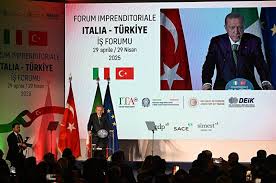Export surge reflects stronger Türkiye-Italy trade relations

Rome: Türkiye’s exports to Italy rose 7.5% in the first five months of 2025 compared to the same period last year, reaching $5.34 billion (TL 211.66 billion), according to official data, as bilateral trade between the two countries continues to steadily grow.
The rise comes amid broader efforts by Türkiye to strengthen trade ties with nearby countries, even as global economic uncertainty continues due to geopolitical tensions and protectionist policies.
Italy remains one of Türkiye’s top trade partners within the European Union, and recent diplomatic efforts have helped boost economic cooperation. In April, President Recep Tayyip Erdoğan and Italian Prime Minister Giorgia Meloni co-chaired the 4th Türkiye-Italy Intergovernmental Summit in Rome, where the two nations signed 11 new agreements spanning defense, energy, innovation, culture and transportation.
“Türkiye and Italy are two strong allies navigating a period where global and regional developments are pushing us toward closer cooperation,” Erdoğan said following the summit. He noted that partnerships in the defense sector would continue to expand.
According to the Turkish Exporters Assembly (TIM), exports to Italy in May alone reached $1.14 billion, an 8% increase year-over-year. Italy accounted for 4.8% of Türkiye’s total exports from January through May, which totaled $110.95 billion, up 3.5% from the same period last year.

The automotive industry led Turkish exports to Italy, bringing in $1.3 billion. Other top sectors included chemicals at $777 million, ferrous and non-ferrous metals at $472.5 million, steel at $456.1 million and textiles at $327 million.
While automotive and textile exports saw slight annual declines of 5.6% and 1.8%, respectively, chemicals rose 14.6%, metals jumped 37.4% and steel grew 9.4%.
Istanbul was the top exporting province to Italy, accounting for $1.8 billion in shipments. Kocaeli followed with $727.4 million, Bursa with $514.6 million, Izmir with $327.2 million and Ankara with $208.2 million.
In an interview on Tuesday, Stefano Kaslowski, president of the Italian Chamber of Commerce and Industry in Türkiye (CCIIST), said the figures reflect the strength and potential of commercial ties between the two countries.
“This success is not a coincidence but a result of deep-rooted, long-standing relations,” Kaslowski told Anadolu Agency (AA). “We’ve been bringing the Turkish and Italian business communities together since 1885.”
Kaslowski noted that more than 1,500 Italian companies operate in Italy with commercial ties to Türkiye, and many have strong investment footprints in the country. He said Italy’s role as Türkiye’s second-largest EU trade partner highlights its strategic importance.
The bilateral trade volume reached $28 billion in 2023, and both countries are aiming to exceed $40 billion in the coming years, according to Kaslowski.
He said the growing trade figures suggest not just numerical growth, but a “structural transformation,” driven by improving Turkish quality standards, better alignment with Italian market needs, and logistics improvements.
Kaslowski emphasized that Italy’s industrial strength in sectors such as machinery, pharmaceuticals, automotive and luxury goods, coupled with its push toward green and digital transformation, creates significant opportunities for Turkish businesses.
Likewise, Türkiye’s young population, production capacity and geographic location make it an attractive destination for Italian investors, he said. He also underlined the importance of modernizing the EU-Türkiye Customs Union to facilitate further trade.
As part of its role, CCIIST provides services including business matchmaking, trade fair coordination, market research and advisory support for new ventures. The organization also arranges bilateral delegations, seminars, and networking events.
Recent CCIIST events, such as the “Risks and Opportunities in Türkiye-Italy Foreign Trade” roundtable, brought together sector experts and officials to find practical solutions to common trade challenges, such as customs optimization and cost reduction.
Kaslowski expressed optimism about the future, especially in areas like sustainability, digital transformation and green technologies.
“If the current trend continues, we expect exports to Italy to reach $12 billion-13 billion by year-end,” he said. “But our goal isn’t just to grow in numbers – we aim to develop high-value, technology-intensive and sustainable trade relationships.”
He added that deeper cooperation between businesses, support for joint R&D and investment in new-generation entrepreneurs would be key to achieving that vision.





